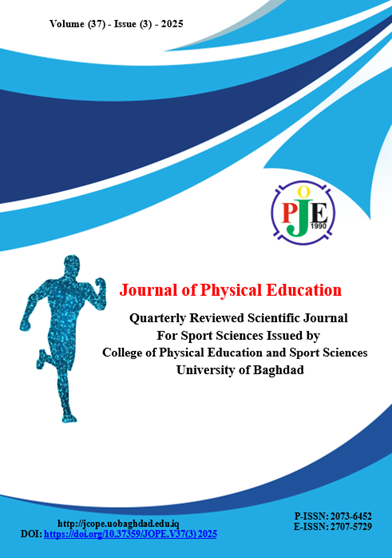Evaluating the performance of the coaches of the Iraqi Gymnastics Federation from the point of view of players and experts
DOI:
https://doi.org/10.37359/JOPE.V37(3)2025.2362Keywords:
Performance Evaluation, Gymnastics Coaches, Athletes’ Perspectives, Experts PerspectivesAbstract
This study focuses on evaluating the performance of coaches of the Iraqi Gymnastics Federation from the perspectives of both athletes and experts, emphasizing the critical role of gymnastics as a foundation for many other sports. The significance of the research lies in improving evaluation mechanisms for gymnastics coaches through the use of validated questionnaires and scientific models, thereby enhancing coaches’ effectiveness and consequently the athletes’ performance. The study employed a descriptive–survey method and included a statistical population of 340 participants, comprising athletes and experts from the Iraqi Gymnastics Federation. Data collection was conducted using the Performance Evaluation Questionnaire developed by Rouhani et al. (2012), which demonstrated high reliability with a Cronbach’s alpha of 0.943. The findings revealed that the average performance evaluation of coaches from both athletes (M = 4.23) and experts (M = 4.24) was significantly higher than the theoretical mean (3), indicating satisfactory coaching performance. Among the evaluated dimensions, the “technical-educational factor” emerged as the most important, followed by team and individual management, team retention, experience, and behavioral-educational aspects. Furthermore, results indicated no significant differences between athletes’ and experts’ evaluations. In conclusion, the overall performance of Iraqi Gymnastics Federation coaches was found to be within the expected standards, with technical-educational factors playing the most critical role in performance evaluation. The study recommends prioritizing the enhancement of coaches’ technical and educational competencies, alongside strengthening behavioral and managerial skills, to ensure comprehensive improvement in both coaching practices and athletes’ achievements.
References
Abdulghani, L. Y., Abdulghani, M. Y., & Abdulkareem, O. W. (2025). Designing a palm pressure measurement device to improve motor coordination in freestyle swimming among female students. Journal of Physical Education and Sport. https://doi.org/10.7752/jpes.2025.07168
Abdulhussain, A. A., Abdulkareem, O. W., Atiyah, H. S., Jaber, O. H., Ghanim, M. R., Hammood, A. H., & Saleh, Y. M. (2025). The Impact of Jesko’s Strategy with Sequential Exercises on Learning the Skill of Dribbling in Basketball. Annals of Applied Sport Science, 0–0. https://doi.org/10.61186/AASSJOURNAL.1550
Abdulkareem, O. W., & Ali Hassan, M. F. (2025). impact of mental games on improving shooting accuracy among young basketball players in Iraqi clubs. Scientific Journal of Sport and Performance, 4(3), 342–351. https://doi.org/10.55860/OHNP7224
Abdulkareem, O. W., Fadhel, M., Hassan, A., Amer, A., & Atiyah, H. (2024). A COMPARATIVE STUDY OF THE MOST IMPORTANT PERSONALITY TRAITS BETWEEN PRACTITIONERS AND NON-PRACTITIONERS OF SPORTS ACTIVITY. https://proximusjournal.com/index.php/PJSSPE
Abdulkareem, O. W., Jabbar, H. S., & Obaid, A. J. (2025). The Effect of Soft Toss Machine Training on Some Kinematic Variables and backhand accuracy of Tennis Players U16 years. Journal of Physical Education (20736452), 37(1), 190–205. https://doi.org/10.37359/JOPE.V37(1)2025.2147
Adnan, Y., Atiyah, H., Neamah, I. H., Abdulreda, F. M., Tariq, O., Abdulhussein, A. A., Abdulmageed, T. S., Amin, D. H., Ahmad, Q., Alhamadani, S., Ridha Ghanim, M., & Ali, H. (2024). THE EFFECT OF THE IMPERATIVE METHOD IN TEACHING PHYSICAL EDUCATION CURRICULA FOR THE PRIMARY STAGE. 23, 2024.
Bluckert, P. (2005). The foundations of a psychological approach to executive coaching. Industrial and Commercial training.
Ghanim, M. R. (2025). The Neurocognitive Effect Of Augmented Visual Feedback On Learning The Back Handspring Skill In Gymnastics Among College Students Diverse Learning Methods. Indonesian Journal of Physical Education and Sport Science, 5(3), 397–407.
Mahmoud Daoud Al-Rubaie et al. (2001) Theories and Methods of Physical Education, Dar Al-Kutub for Printing and Publishing, Baghdad.
Mahmoud Daoud Al-Rubaie et al. (2022) Coach and Sport Training, Dar Al-Sadiq Cultural Foundation, Babylon, Iraq.
Muttib, F., Hamzah, M., & Fadhel, M. (2024). Psychological Toughness and its Relationship to Some Coordination, Physical Abilities and Accuracy of Some Basic Skills Performance Among The Iraqi Junior National Handball Team Players. International Journal of Disabilities Sports and Health Sciences, 330–336. https://doi.org/10.33438/ijdshs.1436061
Parsloe, E. (2012). The manager as coach and mentor. Universities Press.
Publishing.
Waleed Abdulkareem, O., & Sattar Jabbar, H. (2025). Comparative Biomechanical Analysis of Three-Point Shooting Between Elite Iraqi Basketball Players and International Counterparts. Journal of Sport Biomechanics, 11(3), 326–342. https://doi.org/10.61882/JSportBiomech.11.3.326
Whitmore, J. (1997). Coaching for Performance,‖ Nicholas Brealey
Zureigat, A., Al-eliwah, S., Fattah, O. A., Alzughailat, M., & A’mir, O. (2023). Exploring the Effect of Six Weeks of Mental Visualization on the Three-Shot Accuracy in Basketball. Journal of Exercise Physiology Online, 26(3).
Downloads
Published
Issue
Section
License
Copyright (c) 2025 Journal of Physical Education

This work is licensed under a Creative Commons Attribution-NonCommercial 4.0 International License.






 The Journal of Physical Education (JOPE) applies a Creative Commons Attribution 4.0 International license (CC BY 4.0), which lets others distribute, remix, tweak, and build upon your work, even commercially, as long as they credit you for the original creation. For more information, click the link :
The Journal of Physical Education (JOPE) applies a Creative Commons Attribution 4.0 International license (CC BY 4.0), which lets others distribute, remix, tweak, and build upon your work, even commercially, as long as they credit you for the original creation. For more information, click the link : 